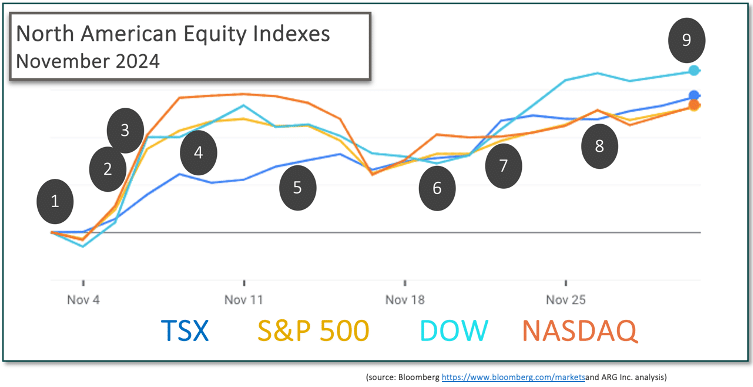Last Month in the Markets: November 1st – 29th, 2024

What happened in November?
The previous month concluded with the release of positive inflation news, setting the scene for positive equity results in November. On October 31st, it was announced that the U.S. Personal Consumption Expenditures (PCE) price index for September had dropped 0.2 percent to 2.1 percent on a year-over-year basis. As the Federal Reserve’s preferred inflation indicator, lower interest rates are anticipated.
The first full week of November included the U.S. federal election that delivered a decisive Republican victory, and a boost to most markets. BEA PCE release CNBC and PCE

Other notable events and announcements included:
- November 1st
U.S. employment (+12,000) and unemployment at 4.1 percent were unchanged in October according to the nonfarm payroll report. The lower than expected jobs increase and election uncertainty conspired to create a dip for equities to start November. BLS Nonfarm Payrolls release
2. November 5th to 8th
A decisive election win was the best result for equity investors. A Republican-controlled Senate and House will facilitate the confirmation of federal appointees and the passing of laws. President-elect Trump has promised an extension to his 2017 corporate tax reductions, increased government spending and decreased regulation, which encourage positive corporate results and increased values. NBC News and markets Global and election results CNBC on elections and markets
3. November 6th
The Federal Reserve lowered its policy interest rate by ¼ percent (25 basis points). The release included “In support of its goals, the Committee decided to lower the target range for the federal funds rate by 1/4 percentage point to 4-1/2 to 4-3/4 percent. In considering additional adjustments to the target range for the federal funds rate, the Committee will carefully assess incoming data, the evolving outlook, and the balance of risks.” Fed release
4. November 8th
StatsCan’s Labour Force Survey for October reported that employment (+15,000) and unemployment (6.5%) remained static. Despite the lack of jobs growth in October, employment was up 303,000 on a year-over-year basis. StatsCan release
5. November 13th
Markets settled downward after the large gains of the previous week that had been driven by certainty of U.S. election victories. Once the election results were decided, markets refocused on corporate performance and overall economic conditions to drive markets. CNBC election and valuation
Before markets opened, the U.S. Consumer Price Index (CPI) for October was reported. For the fourth consecutive month CPI increased 0.2 percent on a monthly basis. On a year-over-year basis consumer prices have increased 2.6 percent. BLS CPI release
The inflation results suggest that central banks may slow the pace and size of rate cuts as inflation moved upward. Tariff promises made by President-elect Trump could further exacerbate inflation, which would delay rate cuts further into the future. CNBC and CPI (2)
6. November 19th
The Canadian Consumer Price Index (CPI) rose 2.0% on a year-over-year basis in October, up from the 1.6% increase in September. This is the first increase in the rate of inflation since May. Although the rate of inflation has increased, it is at the goal rate set by the Bank of Canada. Over the past three years, prices for goods rose 10.2%, while prices for services increased 14.2%. StatsCan CPI release CBC and CPI
7. November 22nd
Strong corporate results spurred equities along as earnings season drew to a close. After 95 percent of the S&P 500 had reported their Q3 results, three-quarters of the companies reported a positive Earnings Per Share (EPS) surprise, and nearly two-thirds reported a positive revenue surprise. FactSet Earnings Insight
8. November 27th
The Personal Consumption Expenditures price index (PCE) showed that prices rose 0.2% in October and increased by 2.3% on a year-over-year basis. For the month the price of services rose 0.4%, while goods prices fell 0.1%, food prices were little changed, while energy prices fell 0.1%. The annualized inflation rate met expectations. BEA PCE release CNBC and PCE
9. November 29th
Canada’s economic growth has stalled. After remaining unchanged in August, Gross Domestic Product (GDP) edged up 0.1% in September. Real GDP increased 0.3% in the third quarter, after rising 0.5% in both the first and second quarters of 2024. On a per capita basis, GDP fell 0.4% in the third quarter, which was the sixth consecutive quarterly decline. On an annualized basis, the Canadian economy grew 1% in the third quarter, down from 2.2% in the second quarter. StatsCan Sept GDP StatsCan Q3 GDP CTV and GDP
What’s ahead for December and beyond?
November was a successful month for equity investors as economic news and U.S. politics provided a positive push. Whether the economic indicators provide enough impetus for the Bank of Canada and the Federal Reserve to continue their rate-cutting cycle is not certain.
The first indication will occur on December 11th, when the Bank of Canada delivers its next interest rate decision. The Fed follows one week later.
December has typically given investors an opportunity for tax-loss selling. However, in 2024 the North American equity indexes have risen between 19 and 28 percent, which limits opportunities to consolidate positions for the current tax year.
Remember that deadlines are approaching for RRSPs, TFSAs, RESPs and RDSPs.
Information contained in this publication has been compiled from sources believed to be reliable, but no representation or warranty, express or implied, is made by MRG Wealth Management Inc., or any other person or business as to its accuracy, completeness, or correctness. Nothing in this publication constitutes legal, accounting or tax advice or individually tailored investment advice. This material is prepared for general circulation and has been prepared without regard to the individual financial circumstances and objectives of the persons who receive it. This is not an offer to sell or a solicitation of an offer to buy any securities. Contact your financial advisor in Calgary or your Financial Planner in Calgary to discuss your personal situation.
